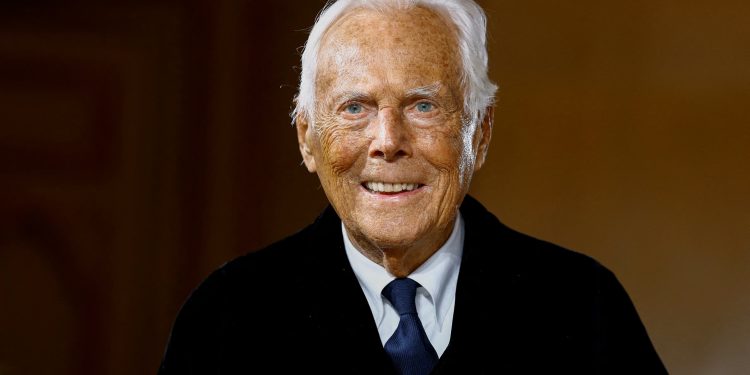By Mohamed Salim Rotea
Legendary Italian fashion designer Giorgio Armani, whose timeless designs revolutionized menswear and womenswear, passed away peacefully at his home in Milan on September 4, 2025, at the age of 91. The Armani Group confirmed the news in a statement, describing him as the company’s “creator, founder, and tireless driving force,” who remained actively involved in collections and projects until his final days.
Armani had been in declining health in recent months. In June 2025, he missed his runway show at Milan Men’s Fashion Week for the first time in his career, recovering at home from an undisclosed condition. Despite this, he oversaw the event remotely, emphasizing his control over every detail. His death comes just weeks before planned celebrations for the 50th anniversary of his brand, including an exhibition at Milan’s Pinacoteca di Brera.
Born on July 11, 1934, in Piacenza, Italy, Armani initially studied medicine before pivoting to fashion in the 1960s. He founded his eponymous label in 1975 with his late partner Sergio Galeotti, starting with the sale of his Volkswagen Beetle to fund the venture. Armani’s breakthrough came with his deconstructed suits soft, unstructured jackets that revealed the body beneath, pioneering “soft power dressing.” This style exploded globally after dressing Richard Gere in the 1980 film American Gigolo, making Armani a household name.
Over five decades, Armani built a global empire valued at billions, encompassing haute couture (Armani Privé), ready-to-wear (Emporio Armani), sportswear (EA7), home furnishings, fragrances, and even luxury hotels. He remained the sole shareholder, rejecting offers from conglomerates like LVMH and Kering, valuing independence as “an essential value.” In 2023, the company reported revenues of $2.65 billion. Armani was also a pioneer in social issues, banning underweight models from his runways in 2006 following the death of model Ana Carolina Reston.
Tributes poured in from around the world. Italian Prime Minister Giorgia Meloni called him “an icon, a tireless worker, a symbol of the best of Italy.” Designer Donatella Versace posted on Instagram: “The world lost a giant today. He made history and will be remembered forever.” Actor Russell Crowe shared personal anecdotes, noting Armani’s role in key moments of his life, from awards to his wedding. Julia Roberts, a longtime muse, wrote: “A true friend. A legend.” Vogue’s Anna Wintour praised his vision: “He understood power and attitude and elegance as well as anyone ever has in fashion.”
Armani’s influence extended beyond fashion; he designed uniforms for Italy’s Olympic teams, owned basketball club Olimpia Milano, and contributed to films like The Wolf of Wall Street. In a recent Financial Times interview, he reflected on his workaholic nature: “My only regret in life was spending too many hours working and not enough time with friends and family.”
No obvious heir has been named, but Armani outlined a “gradual transition” to family and trusted colleagues. A funeral chamber will open in Milan on September 6-7, with a private funeral to follow.
Armani’s legacy endures in his minimalist elegance, which shaped modern fashion and projected Italian style worldwide. As Versace noted, his impact “will be remembered forever.”











